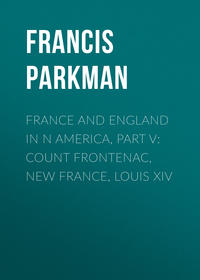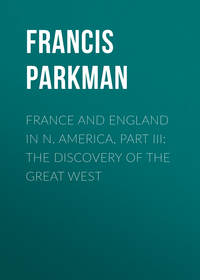 полная версия
полная версияFrance and England in N America, Part VII, Vol 1: A Half-Century of Conflict
The settlements of Maine were a dependency of Massachusetts,—a position that did not please their inhabitants, but which they accepted because they needed the help of their Puritan neighbors, from whom they differed widely both in their qualities and in their faults. The Indian wars that checked their growth had kept them in a condition more than half barbarous. They were a hard-working and hard-drinking race; for though tea and coffee were scarcely known, the land flowed with New England rum, which was ranked among the necessaries of life. The better sort could read and write in a bungling way; but many were wholly illiterate, and it was not till long after Queen Anne's War that the remoter settlements established schools, taught by poor students from Harvard or less competent instructors, and held at first in private houses or under sheds. The church at Wells had been burned by the Indians; and though the settlers were beggared by the war, they voted in town-meeting to build another. The new temple, begun in 1699, was a plain wooden structure thirty feet square. For want of money the windows long remained unglazed, the walls without plaster, and the floor without seats; yet services were duly held here under direction of the minister, Samuel Emery, to whom they paid £45 a year, half in provincial currency, and half in farm-produce and fire-wood.
In spite of these efforts to maintain public worship, they were far from being a religious community; nor were they a peaceful one. Gossip and scandal ran riot; social jealousies abounded; and under what seemed entire democratic equality, the lazy, drunken, and shiftless envied the industrious and thrifty. Wells was infested, moreover, by several "frightfully turbulent women," as the chronicle styles them, from whose rabid tongues the minister himself did not always escape; and once, in its earlier days, the town had been indicted for not providing a ducking-stool to correct these breeders of discord.
Judicial officers were sometimes informally chosen by popular vote, and sometimes appointed by the governor of Massachusetts from among the inhabitants. As they knew no law, they gave judgment according to their own ideas of justice, and their sentences were oftener wanting in wisdom than in severity. Until after 1700 the county courts met by beat of drum at some of the primitive inns or taverns with which the frontier abounded.
At Wells and other outlying and endangered hamlets life was still exceedingly rude. The log-cabins of the least thrifty were no better furnished than Indian wigwams. The house of Edmond Littlefield, reputed the richest man in Wells, consisted of two bedrooms and a kitchen, which last served a great variety of uses, and was supplied with a table, a pewter pot, a frying-pan, and a skillet; but no chairs, cups, saucers, knives, forks, or spoons. In each of the two bedrooms there was a bed, a blanket, and a chest. Another village notable—Ensign John Barrett—was better provided, being the possessor of two beds, two chests and a box, four pewter dishes, four earthen pots, two iron pots, seven trays, two buckets, some pieces of wooden-ware, a skillet, and a frying-pan. In the inventory of the patriarchal Francis Littlefield, who died in 1712, we find the exceptional items of one looking-glass, two old chairs, and two old books. Such of the family as had no bed slept on hay or straw, and no provision for the toilet is recorded.46
On the tenth of August, 1703, these rugged borderers were about their usual callings, unconscious of danger,—the women at their household work, the men in the fields or on the more distant salt-marshes. The wife of Thomas Wells had reached the time of her confinement, and her husband had gone for a nurse. Some miles east of Wells's cabin lived Stephen Harding,—hunter, blacksmith, and tavern-keeper, a sturdy, good-natured man, who loved the woods, and whose frequent hunting trips sometimes led him nearly to the White Mountains. Distant gunshots were heard from the westward, and his quick eye presently discovered Indians approaching, on which he told his frightened wife to go with their infant to a certain oak-tree beyond the creek while he waited to learn whether the strangers were friends or foes.
That morning several parties of Indians had stolen out of the dismal woods behind the houses and farms of Wells, and approached different dwellings of the far-extended settlement at about the same time. They entered the cabin of Thomas Wells, where his wife lay in the pains of childbirth, and murdered her and her two small children. At the same time they killed Joseph Sayer, a neighbor of Wells, with all his family.
Meanwhile Stephen Harding, having sent his wife and child to a safe distance, returned to his blacksmith's shop, and, seeing nobody, gave a defiant whoop; on which four Indians sprang at him from the bushes. He escaped through a back-door of the shop, eluded his pursuers, and found his wife and child in a cornfield, where the woman had fainted with fright. They spent the night in the woods, and on the next day, after a circuit of nine miles, reached the palisaded house of Joseph Storer.
They found the inmates in distress and agitation. Storer's daughter Mary, a girl of eighteen, was missing. The Indians had caught her, and afterwards carried her prisoner to Canada. Samuel Hill and his family were captured, and the younger children butchered. But it is useless to record the names and fate of the sufferers. Thirty-nine in all, chiefly women and children, were killed or carried off, and then the Indians disappeared as quickly and silently as they had come, leaving many of the houses in flames.
This raid upon Wells was only part of a combined attack on all the settlements from that place to Casco. Those eastward of Wells had been, as we have seen, abandoned in the last war, excepting the forts and fortified houses; but the inhabitants, reassured, no doubt, by the Treaty of Casco, had begun to return. On this same day, the tenth of August, they were startled from their security. A band of Indians mixed with Frenchmen fell upon the settlements about the stone fort near the Falls of the Saco, killed eleven persons, captured twenty-four, and vainly attacked the fort itself. Others surprised the settlers at a place called Spurwink, and killed or captured twenty-two. Others, again, destroyed the huts of the fishermen at Cape Porpoise, and attacked the fortified house at Winter Harbor, the inmates of which, after a brave resistance, were forced to capitulate. The settlers at Scarborough were also in a fortified house, where they made a long and obstinate defence till help at last arrived. Nine families were settled at Purpooduck Point, near the present city of Portland. They had no place of refuge, and the men being, no doubt, fishermen, were all absent, when the Indians burst into the hamlet, butchered twenty-five women and children, and carried off eight.
The fort at Casco, or Falmouth, was held by Major March, with thirty-six men. He had no thought of danger, when three well-known chiefs from Norridgewock appeared with a white flag, and asked for an interview. As they seemed to be alone and unarmed, he went to meet them, followed by two or three soldiers and accompanied by two old men named Phippeny and Kent, inhabitants of the place. They had hardly reached the spot when the three chiefs drew hatchets from under a kind of mantle which they wore and sprang upon them, while other Indians, ambushed near by, leaped up and joined in the attack. The two old men were killed at once; but March, who was noted for strength and agility, wrenched a hatchet from one of his assailants, and kept them all at bay till Sergeant Hook came to his aid with a file of men and drove them off.
They soon reappeared, burned the deserted cabins in the neighborhood, and beset the garrison in numbers that continually increased, till in a few days the entire force that had been busied in ravaging the scattered settlements was gathered around the place. It consisted of about five hundred Indians of several tribes, and a few Frenchmen under an officer named Beaubassin. Being elated with past successes, they laid siege to the fort, sheltering themselves under a steep bank by the water-side and burrowing their way towards the rampart. March could not dislodge them, and they continued their approaches till the third day, when Captain Southack, with the Massachusetts armed vessel known as the "Province Galley," sailed into the harbor, recaptured three small vessels that the Indians had taken along the coast, and destroyed a great number of their canoes, on which they gave up their enterprise and disappeared.47
Such was the beginning of Queen Anne's War. These attacks were due less to the Abenakis than to the French who set them on. "Monsieur de Vaudreuil," writes the Jesuit historian Charlevoix, "formed a party of these savages, to whom he joined some Frenchmen under the direction of the Sieur de Beaubassin, when they effected some ravages of no great consequence; they killed, however, about three hundred men." This last statement is doubly incorrect. The whole number of persons killed and carried off during the August attacks did not much exceed one hundred and sixty;48 and these were of both sexes and all ages, from octogenarians to newborn infants. The able-bodied men among them were few, as most of the attacks were made upon unprotected houses in the absence of the head of the family; and the only fortified place captured was the garrison-house at Winter Harbor, which surrendered on terms of capitulation. The instruments of this ignoble warfare and the revolting atrocities that accompanied it were all, or nearly all, converted Indians of the missions. Charlevoix has no word of disapproval for it, and seems to regard its partial success as a gratifying one so far as it went.
One of the objects was, no doubt, to check the progress of the English settlements; but, pursues Charlevoix, "the essential point was to commit the Abenakis in such a manner that they could not draw back."49 This object was constantly kept in view. The French claimed at this time that the territory of Acadia reached as far westward as the Kennebec, which therefore formed, in their view, the boundary between the rival nations, and they trusted in the Abenakis to defend this assumed line of demarcation. But the Abenakis sorely needed English guns, knives, hatchets, and kettles, and nothing but the utmost vigilance could prevent them from coming to terms with those who could supply their necessities. Hence the policy of the French authorities on the frontier of New England was the opposite of their policy on the frontier of New York. They left the latter undisturbed, lest by attacking the Dutch and English settlers they should stir up the Five Nations to attack Canada; while, on the other hand, they constantly spurred the Abenakis against New England, in order to avert the dreaded event of their making peace with her.
The attack on Wells, Casco, and the intervening settlements was followed by murders and depredations that lasted through the autumn and extended along two hundred miles of frontier. Thirty Indians attacked the village of Hampton, killed the Widow Mussey, a famous Quakeress, and then fled to escape pursuit. At Black Point nineteen men going to their work in the meadows were ambushed by two hundred Indians, and all but one were shot or captured. The fort was next attacked. It was garrisoned by eight men under Lieutenant Wyatt, who stood their ground for some time, and then escaped by means of a sloop in the harbor. At York the wife and children of Arthur Brandon were killed, and the Widow Parsons and her daughter carried off. At Berwick the Indians attacked the fortified house of Andrew Neal, but were repulsed with the loss of nine killed and many wounded, for which they revenged themselves by burning alive Joseph Ring, a prisoner whom they had taken. Early in February a small party of them hovered about the fortified house of Joseph Bradley at Haverhill, till, seeing the gate open and nobody on the watch, they rushed in. The woman of the house was boiling soap, and in her desperation she snatched up the kettle and threw the contents over them with such effect that one of them, it is said, was scalded to death. The man who should have been on the watch was killed, and several persons were captured, including the woman. It was the second time that she had been a prisoner in Indian hands. Half starved and bearing a heavy load, she followed her captors in their hasty retreat towards Canada. After a time she was safely delivered of an infant in the midst of the winter forest; but the child pined for want of sustenance, and the Indians hastened its death by throwing hot coals into its mouth when it cried. The astonishing vitality of the woman carried her to the end of the frightful journey. A Frenchman bought her from the Indians, and she was finally ransomed by her husband.
By far the most dangerous and harassing attacks were those of small parties skulking under the edge of the forest, or lying hidden for days together, watching their opportunity to murder unawares, and vanishing when they had done so. Against such an enemy there was no defence. The Massachusetts government sent a troop of horse to Portsmouth, and another to Wells. These had the advantage of rapid movement in case of alarm along the roads and forest-paths from settlement to settlement; but once in the woods, their horses were worse than useless, and they could only fight on foot. Fighting, however, was rarely possible; for on reaching the scene of action they found nothing but mangled corpses and burning houses.
The best defence was to take the offensive. In September Governor Dudley sent three hundred and sixty men to the upper Saco, the haunt of the Pequawket tribe; but the place was deserted. Major, now Colonel, March soon after repeated the attempt, killing six Indians, and capturing as many more. The General Court offered £40 for every Indian scalp, and one Captain Tyng, in consequence, surprised an Indian village in midwinter and brought back five of these disgusting trophies. In the spring of 1704 word came from Albany that a band of French Indians had built a fort and planted corn at Coos meadows, high up the river Connecticut. On this, one Caleb Lyman with five friendly Indians, probably Mohegans, set out from Northampton, and after a long march through the forest, surprised, under cover of a thunderstorm, a wigwam containing nine warriors,—bound, no doubt, against the frontier. They killed seven of them; and this was all that was done at present in the way of reprisal or prevention.50
The murders and burnings along the borders were destined to continue with little variety and little interruption during ten years. It was a repetition of what the pedantic Cotton Mather calls Decennium luctuosum, or the "woful decade" of William and Mary's War. The wonder is that the outlying settlements were not abandoned. These ghastly, insidious, and ever-present dangers demanded a more obstinate courage than the hottest battle in the open field.
One curious frontier incident may be mentioned here, though it did not happen till towards the end of the war. In spite of poverty, danger, and tribulation, marrying and giving in marriage did not cease among the sturdy borderers; and on a day in September there was a notable wedding feast at the palisaded house of John Wheelwright, one of the chief men of Wells. Elisha Plaisted was to espouse Wheelwright's daughter Hannah, and many guests were assembled, some from Portsmouth, and even beyond it. Probably most of them came in sailboats; for the way by land was full of peril, especially on the road from York, which ran through dense woods, where Indians often waylaid the traveller. The bridegroom's father was present with the rest. It was a concourse of men in homespun, and women and girls in such improvised finery as their poor resources could supply; possibly, in default of better, some wore nightgowns, more or less disguised, over their daily dress, as happened on similar occasions half a century later among the frontiersmen of West Virginia.51 After an evening of rough merriment and gymnastic dancing, the guests lay down to sleep under the roof of their host or in adjacent barns and sheds. When morning came, and they were preparing to depart, it was found that two horses were missing; and not doubting that they had strayed away, three young men—Sergeant Tucker, Joshua Downing, and Isaac Cole—went to find them. In a few minutes several gunshots were heard. The three young men did not return. Downing and Cole were killed, and Tucker was wounded and made prisoner.
Believing that, as usual, the attack came from some small scalping-party, Elisha Plaisted and eight or ten more threw themselves on the horses that stood saddled before the house, and galloped across the fields in the direction of the firing; while others ran to cut off the enemy's retreat. A volley was presently heard, and several of the party were seen running back towards the house. Elisha Plaisted and his companions had fallen into an ambuscade of two hundred Indians. One or more of them were shot, and the unfortunate bridegroom was captured. The distress of his young wife, who was but eighteen, may be imagined.
Two companies of armed men in the pay of Massachusetts were then in Wells, and some of them had come to the wedding. Seventy marksmen went to meet the Indians, who ensconced themselves in the edge of the forest, whence they could not be dislodged. There was some desultory firing, and one of the combatants was killed on each side, after which the whites gave up the attack, and Lieutenant Banks went forward with a flag of truce, in the hope of ransoming the prisoners. He was met by six chiefs, among whom were two noted Indians of his acquaintance, Bomazeen and Captain Nathaniel. They well knew that the living Plaisted was worth more than his scalp; and though they would not come to terms at once, they promised to meet the English at Richmond's Island in a few days and give up both him and Tucker on payment of a sufficient ransom. The flag of truce was respected, and Banks came back safe, bringing a hasty note to the elder Plaisted from his captive son. This note now lies before me, and it runs thus, in the dutiful formality of the olden time:—
Sir,—I am in the hands of a great many Indians, with which there is six captains. They say that what they will have for me is 50 pounds, and thirty pounds for Tucker, my fellow prisoner, in good goods, as broadcloth, some provisions, some tobacco pipes, Pomisstone [pumice-stone], stockings, and a little of all things. If you will, come to Richmond's Island in 5 days at farthest, for here is 200 Indians, and they belong to Canada.
If you do not come in 5 days, you will not see me, for Captain Nathaniel the Indian will not stay no longer, for the Canada Indians is not willing for to sell me. Pray, Sir, don't fail, for they have given me one day, for the days were but 4 at first. Give my kind love to my dear wife. This from your dutiful son till death,
Elisha Plaisted.
The alarm being spread and a sufficient number of men mustered, they set out to attack the enemy and recover the prisoners by force; but not an Indian could be found.
Bomazeen and Captain Nathaniel were true to the rendezvous; in due time Elisha Plaisted was ransomed and restored to his bride.52
CHAPTER IV
1704-1740DEERFIELDHertel de Rouville.—A Frontier Village.—Rev. John Williams.—The Surprise.—Defence of the Stebbins House.—Attempted Rescue.—The Meadow Fight.—The Captives.—The Northward March.—Mrs. Williams killed.—The Minister's Journey.—Kindness of Canadians.—A Stubborn Heretic.—Eunice Williams.—Converted Captives.—John Sheldon's Mission.—Exchange of Prisoners.—An English Squaw.—The Gill Family
About midwinter the governor of Canada sent another large war-party against the New England border. The object of attack was an unoffending hamlet, that from its position could never be a menace to the French, and the destruction of which could profit them nothing. The aim of the enterprise was not military, but political. "I have sent no war-party towards Albany," writes Vaudreuil, "because we must do nothing that might cause a rupture between us and the Iroquois; but we must keep things astir in the direction of Boston, or else the Abenakis will declare for the English." In short, the object was fully to commit these savages to hostility against New England, and convince them at the same time that the French would back their quarrel.53
The party consisted, according to French accounts, of fifty Canadians and two hundred Abenakis and Caughnawagas,—the latter of whom, while trading constantly with Albany, were rarely averse to a raid against Massachusetts or New Hampshire.54 The command was given to the younger Hertel de Rouville, who was accompanied by four of his brothers. They began their march in the depth of winter, journeyed nearly three hundred miles on snow-shoes through the forest, and approached their destination on the afternoon of the twenty-eighth of February, 1704. It was the village of Deerfield, which then formed the extreme northwestern frontier of Massachusetts,—its feeble neighbor, the infant settlement of Northfield, a little higher up the Connecticut, having been abandoned during the last war. Rouville halted his followers at a place now called Petty's Plain, two miles from the village; and here, under the shelter of a pine forest, they all lay hidden, shivering with cold,—for they dared not make fires,—and hungry as wolves, for their provisions were spent. Though their numbers, by the lowest account, were nearly equal to the whole population of Deerfield,—men, women, and children,—they had no thought of an open attack, but trusted to darkness and surprise for an easy victory.
Deerfield stood on a plateau above the river meadows, and the houses—forty-one in all—were chiefly along the road towards the villages of Hadley and Hatfield, a few miles distant. In the middle of the place, on a rising ground called Meeting-house Hill, was a small square wooden meeting-house. This, with about fifteen private houses, besides barns and sheds, was enclosed by a fence of palisades eight feet high, flanked by "mounts," or blockhouses, at two or more of the corners. The four sides of this palisaded enclosure, which was called the fort, measured in all no less than two hundred and two rods, and within it lived some of the principal inhabitants of the village, of which it formed the centre or citadel. Chief among its inmates was John Williams, the minister, a man of character and education, who, after graduating at Harvard, had come to Deerfield when it was still suffering under the ruinous effects of King Philip's War, and entered on his ministry with a salary of sixty pounds in depreciated New England currency, payable, not in money, but in wheat, Indian-corn, and pork.55 His parishioners built him a house, he married, and had now eight children, one of whom was absent with friends at Hadley.56 His next neighbor was Benoni Stebbins, sergeant in the county militia, who lived a few rods from the meeting-house. About fifty yards distant, and near the northwest angle of the enclosure, stood the house of Ensign John Sheldon, a framed building, one of the largest in the village, and, like that of Stebbins, made bullet-proof by a layer of bricks between the outer and inner sheathing, while its small windows and its projecting upper story also helped to make it defensible.
The space enclosed by the palisade, though much too large for effective defence, served in time of alarm as an asylum for the inhabitants outside, whose houses were scattered,—some on the north towards the hidden enemy, and some on the south towards Hadley and Hatfield. Among those on the south side was that of the militia captain, Jonathan Wells, which had a palisade of its own, and, like the so-called fort, served as an asylum for the neighbors.
These private fortified houses were sometimes built by the owners alone, though more often they were the joint work of the owners and of the inhabitants, to whose safety they contributed. The palisade fence that enclosed the central part of the village was made under a vote of the town, each inhabitant being required to do his share; and as they were greatly impoverished by the last war, the General Court of the province remitted for a time a part of their taxes in consideration of a work which aided the general defence.57
Down to the Peace of Ryswick the neighborhood had been constantly infested by scalping-parties, and once the village had been attacked by a considerable force of French and Indians, who were beaten off. Of late there had been warnings of fresh disturbance. Lord Cornbury, governor of New York, wrote that he had heard through spies that Deerfield was again to be attacked, and a message to the same effect came from Peter Schuyler, who had received intimations of the danger from Mohawks lately on a visit to their Caughnawaga relatives. During the autumn the alarm was so great that the people took refuge within the palisades, and the houses of the enclosure were crowded with them; but the panic had now subsided, and many, though not all, had returned to their homes. They were reassured by the presence of twenty volunteers from the villages below, whom, on application from the minister, Williams, the General Court had sent as a garrison to Deerfield, where they were lodged in the houses of the villagers. On the night when Hertel de Rouville and his band lay hidden among the pines there were in all the settlement a little less than three hundred souls, of whom two hundred and sixty-eight were inhabitants, twenty were yeomen soldiers of the garrison, two were visitors from Hatfield, and three were negro slaves. They were of all ages,—from the Widow Allison, in her eighty-fifth year, to the infant son of Deacon French, aged four weeks.58







